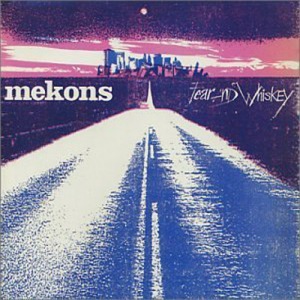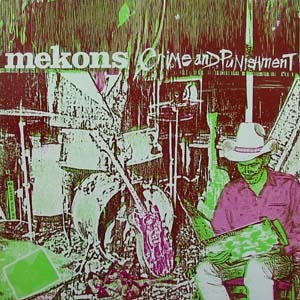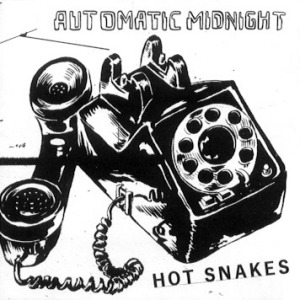|
As I mentioned in the Breeders/Unrest entry, virtually every trip to Looney Tunes offers some long out-of-print album that I’m thrilled to find. This time it was the Mekons’ Fear and Whiskey, their finest album and an LP I’d been searching for since I first heard the group. Judging by Discogs prices, $15 looks like an entirely reasonable price for the album. Hot Snakes’ Automatic Midnight was a leftover from my previous visit.
One note on Looney Tunes: their just-in bin never contains anything exciting. New stock seems to be filed into the letter sections fairly quickly, so things like these Mekons LPs pop up as nice surprises.
86. Mekons – Fear and Whiskey LP – Sin, 1985 – $15

Fear and Whiskey is the undeniable classic of the Mekons’ catalog, a point substantiated by a glowing Pitchfork review of its Touch & Go reissue and a somewhat more restrained Dusted take on the album. Both reviews cover the socio-political context surrounding the album’s creation, but I’ll recap briefly. The Mekons were a loose collective of leftist post-punks that formed in 1977 in Leeds (alongside Gang of Four, who provided them with the instruments for their first LP) but had splintered apart by the early 1980s. The group reformed in full during the 1984-1985 UK Miners’ Strike, playing shows in support of the striking union and debuting their newfound combination of punk and country. (Whether this record is the official start of alt-country is debateable; my feeling is that current-day alt-country bands sound far more like Uncle Tupelo, not the Mekons.) Fear and Whiskey encapsulates that era of British and American political unrest and the class dominance of both Thatcher and Reagan. It’s by no means limited to that era—a period of British history I know far too little about—and like other great politically inspired records, it speaks to countless other time periods as well.
What impresses me most about Fear and Whiskey, especially after encountering a few other stray Mekons albums, is its focus. The Mekons’ stylistic restlessness is both endearing and infuriating: it’s the sign of a band that continues to challenge the notions of its own aesthetics and refuses to take itself too seriously, but also over-indulges in irritating genre explorations. At only ten songs and thirty-five minutes, Fear and Whiskey leaves those indulgences to its b-sides. The mix of country and western, punk, and Irish folk is inspired and consistent, even when one of those elements comes to the forefront. Like W. H. Auden’s WWII-era poems, Fear and Whiskey is shaped by the urgency of its historical context.
This discussion probably positions Fear and Whiskey as an album to be admired or appreciated rather than enjoyed, but that’s not the case. Even on the more explicitly political tracks, like “Trouble Down South” and “Abernant 1984/1985,” elements like Sally Timms’ lilting background vocals and rockabilly guitar leads keep the songs alive. Less specifically historical songs like “Chivalry” and “Last Dance” linger with impossible romances and beaten-down spirits even as their melodies and Susie Honeyman’s fiddle lines keep the tone upbeat. It’s an album great enough to work on all of these levels without stretching itself thin.
87. Mekons – Crime and Punishment LP – Sin, 1986 – $12

A four-song EP originally broadcast as a Peel session, Crime and Punishment is a nice companion piece for Fear and Whiskey, which is exactly what 75% of it became on the 1989 Original Sin compilation along with six other bonus tracks. (Non-vinyl obsessed Mekons fans: that is your cue to buy one CD instead of four LPs. It’s out of print, but so are these LPs.) As I just mentioned, Fear and Whiskey is great in part because it’s lean and focused, and while these songs—three originals and a Merle Haggard cover—aren’t unfocused, exactly, they work better here than as padding for the album. The main difference is the intensity; Fear and Whiskey occasionally ratchets up the unease brewing underneath the surface to a palpable edge, whereas these songs, even though they’re ostensibly about drinking, prison, and misery, manage to maintain a ramshackle joy that passes by easier. Completist note: the Merle Haggard cover isn’t included on Original Sin, so if you’re interested in Mekons’ country covers, you’ll have to track Crime and Punishment down.
88. Hot Snakes– Automatic Midnight LP – Swami, 2000 – $12

I ranked Automatic Midnight at #18 on my list of my favorite 40 albums from 2000 to 2004, above Hot Snakes’ later two albums, and I stand by that preference. Am I alone in that sentiment? Suicide Invoice is a close second, to be sure, but the straight-ahead force of Automatic Midnight works so well with Rick Froberg’s unhinged vocals. I’ve heard that John Reis played all (or at least most) of the guitars for the album, which might make Rocket from the Crypt haters cringe, but the garage-rock-from-hell approach of “Let It Come” and “No Hands” is perfect for lines like “Yeah cut ’em off me / I could do this with stumps.” The distorted keyboard/organ on “Salton City” and the Reis-sung “Mystery Boy” (homage to the Wipers song “Alien Boy”?) adds grime to the swaggering propulsion of each song. Many of the songs eschew the dexterous guitar interplay of past Reis/Froberg collaborations for maximum bludgeoning force, often accomplished through a doubled rhythm guitar. Automatic Midnight would be the perfect soundtrack for a modern Western set in a dying city of industry, mixed with the requisite instrumental bits of Godspeed You! Black Emperor. The only challenge would be keeping Nick Cave and Warren Ellis from stealing the soundtrack.
|

